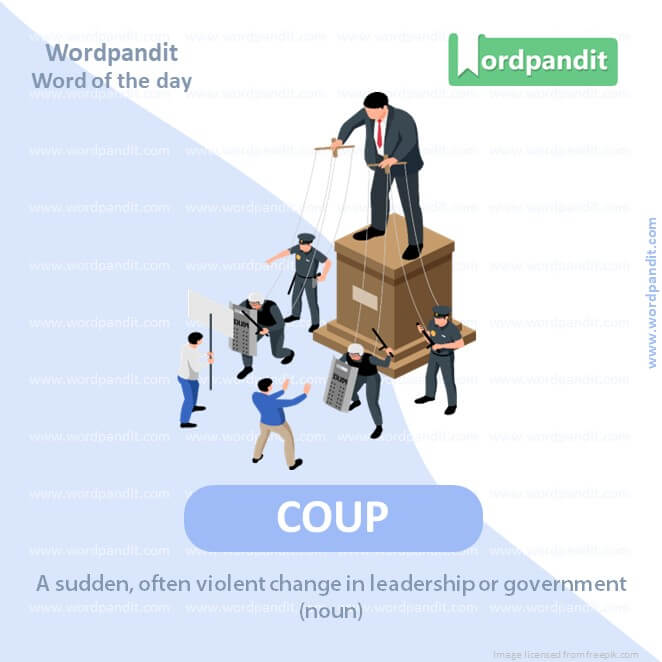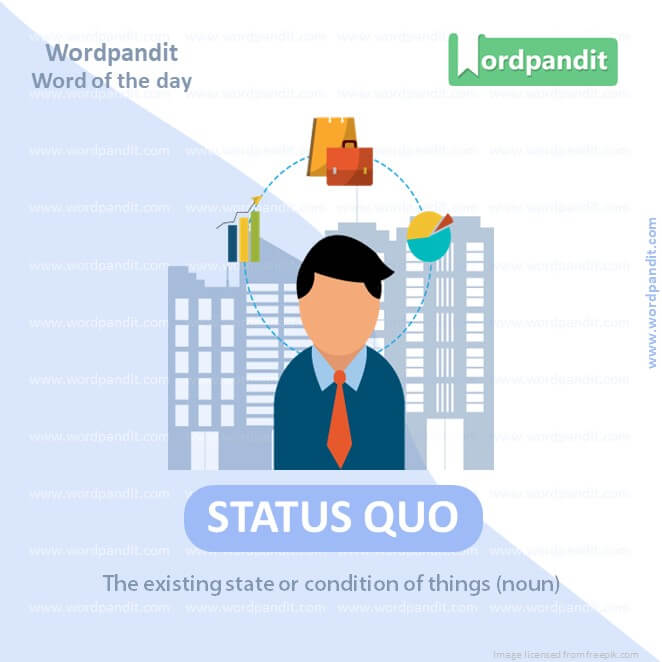Daily Vocabulary Words: List of Daily Used Words in Leading International Newspapers
Hi there. Welcome to this special section @ Wordpandit.
Our endeavour here is very simple: to highlight important daily vocabulary words, which you would come across in leading newspapers in the country. We have included the following newspapers in our selection:
• The New York Times
• The Washington Post
• Scientific American
• BBC
• The Guardian
• Psychology Today
• Wall Street Journal
• The Economist
We are putting in extensive work for developing your vocabulary. All you have got to do is be regular with this section and check out this post on a daily basis. This is your repository of words that are commonly used and essentially, we are posting a list of daily used words. Hence, this has significant practical application as it teaches you words that are used commonly in leading publications mentioned above.
Visit the website daily to learn words from leading international newspapers.

WORD-1: COUP
CONTEXT: It is no coincidence that military-ruled Burkina Faso, Mali and Guinea declared their support for the coup in Niger (and now in Gabon). All three West African states have experienced putsches in recent years, reversing democratic gains that had seen the region briefly shed its tag as Africa’s “coup belt”.
SOURCE: Al Jazeera
EXPLANATORY PARAGRAPH: Imagine you’re playing a game of chess, and you make a really clever move that surprises everyone and helps you win the game. In the grown-up world, sometimes people change who’s in charge of a country really quickly and surprisingly, like a clever chess move. That’s called a “coup.” It’s a big change that happens fast!
MEANING: A sudden, often violent change in leadership or government (noun).
PRONUNCIATION: Koo
SYNONYMS: Overthrow, takeover, insurgency, rebellion, revolution
USAGE EXAMPLES:
1. The military carried out a coup to remove the president.
2. People were shocked by the sudden coup in the neighboring country.
3. The coup was plotted in secret for months.
4. News of the coup spread quickly around the world.

WORD-2: PUTSCH
CONTEXT: It is no coincidence that military-ruled Burkina Faso, Mali and Guinea declared their support for the coup in Niger (and now in Gabon). All three West African states have experienced putsches in recent years, reversing democratic gains that had seen the region briefly shed its tag as Africa’s “coup belt”.
SOURCE: Al Jazeera
EXPLANATORY PARAGRAPH: You know how in some games, like Capture the Flag, one team tries to sneak and take the other team’s flag? “Putsch” is a word grown-ups use when a small group of people try to sneakily take over the government.
MEANING: A secret or sudden attempt by a small group to overthrow a government (noun).
PRONUNCIATION: Pootsh
SYNONYMS: Coup, rebellion, revolt, uprising, insurrection
USAGE EXAMPLES:
1. The putsch was quickly put down by the army.
2. A small group attempted a putsch against the current government.
3. Historians often study famous putsches to understand their impact.
4. The news of the failed putsch became a major headline.

WORD-3: STATUS QUO
CONTEXT:These were either “guardian coups”, which basically reoccur to maintain the status quo, such as the three military interventions in Turkey from 1960 to 1980, or the “veto coups”, which overthrow popularly elected governments, such as the bloody 1973 American-backed putsch against Salvador Allende’s government in Chile.
SOURCE: Al Jazeera
EXPLANATORY PARAGRAPH: “Status quo” is like when you have a favorite bedtime routine, and you don’t want it to change. You brush your teeth, read a book, and go to sleep. In the world of grown-ups, “status quo” means things staying the same and not changing.
MEANING: The existing state or condition of things (noun).
PRONUNCIATION: Stay-tus kwoh
SYNONYMS: Norm, usual, standard, existing condition, current situation
USAGE EXAMPLES:
1. Many people were unhappy with the status quo and wanted change.
2. The government sought to maintain the status quo.
3. Changing the status quo can be difficult.
4. The status quo was challenged by new ideas.

WORD-4: VETO
CONTEXT:These were either “guardian coups”, which basically reoccur to maintain the status quo, such as the three military interventions in Turkey from 1960 to 1980, or the “veto coups”, which overthrow popularly elected governments, such as the bloody 1973 American-backed putsch against Salvador Allende’s government in Chile.
SOURCE: Al Jazeera
EXPLANATORY PARAGRAPH: Imagine you’re building a castle with blocks, and your sibling wants to add a tower that you don’t like. If you say “No, let’s not do that,” you’re using your “veto” power. Grown-ups use “veto” when someone in charge says no to a plan or idea.
MEANING: The power or right to stop or reject a decision or plan (noun).
PRONUNCIATION: Vee-toh
SYNONYMS: Reject, disallow, prohibit, block, overrule
USAGE EXAMPLES:
1. The president used his veto power to block the legislation.
2. The council voted, but the mayor vetoed their decision.
3. She vetoed the idea of moving to a new city.
4. The proposal was passed, but then faced a veto.

WORD-5: JUBILANT
CONTEXT: “Ticket sales still 19% down on 2019.” “Can the Edinburgh fringe survive?” It was surprising to leave a jam-packed, jubilant festival to read those headlines, but then, that’s the fringe for you: so all-encompassing and vast that anything can be said of it – It’s thriving! It’s doomed! It’s art! It’s capitalism! – and still be true.
SOURCE: The Guardian
EXPLANATORY PARAGRAPH: You know how you feel super happy and excited when you get a big scoop of your favourite ice cream? That’s how you feel when you’re “jubilant!” It means you’re so happy that you want to jump up and down and cheer!
MEANING: Feeling or showing extreme happiness and joy (adjective).
PRONUNCIATION: Joo-buh-luhnt
SYNONYMS: Elated, ecstatic, joyful, thrilled, exuberant
USAGE EXAMPLES:
1. She was jubilant after winning the race.
2. The crowd was jubilant when the home team scored.
3. He felt jubilant upon hearing the good news.
4. The students were jubilant about the school trip.
WORD-6: FRINGE
CONTEXT: “Ticket sales still 19% down on 2019.” “Can the Edinburgh fringe survive?” It was surprising to leave a jam-packed, jubilant festival to read those headlines, but then, that’s the fringe for you: so all encompassing and vast that anything can be said of it – It’s thriving! It’s doomed! It’s art! It’s capitalism! – and still be true.
SOURCE: The Guardian
EXPLANATORY PARAGRAPH: Imagine the edge of a rug or the tassels on a scarf; that’s what we call “fringe.” In a bigger sense, “fringe” also means things that are on the edge or not the main part of something.
MEANING: The outer, marginal, or less important part of an area, group, or activity (noun).
PRONUNCIATION: Frij
SYNONYMS: Edge, border, periphery, outskirts, margin
USAGE EXAMPLES:
1. She wore a jacket with fringe on the sleeves.
2. The artist worked on the fringe of mainstream culture.
3. The city’s fringe areas are undergoing development.
4. Fringe groups often have unconventional views.
WORD-7: DOOMED
CONTEXT: “Ticket sales still 19% down in 2019.” “Can the Edinburgh fringe survive?” It was surprising to leave a jam-packed, jubilant festival to read those headlines, but then, that’s the fringe for you: so all-encompassing and vast that anything can be said of it – It’s thriving! It’s doomed! It’s art! It’s capitalism! – and still be true.
SOURCE: The Guardian
EXPLANATORY PARAGRAPH: You know when you’re playing a game and you can tell you’re going to lose? Like your tower of blocks is wobbly and it’s going to fall? That’s when we say it’s “doomed.” It means something bad is sure to happen.
MEANING: Certain to fail or be destroyed (adjective)
PRONUNCIATION: Doomd
SYNONYMS: Fated, destined, condemned, ill-fated, unfortunate
USAGE EXAMPLES:
1. The doomed ship sank into the ocean.
2. His business was doomed from the start.
3. They entered the cave, unaware it was a doomed expedition.
4. The project was doomed due to lack of funding.
WORD-8: GLITTERING
CONTEXT: It was “the summer of girl power,” a tour de force by a glittering troika. With pink dream houses, songs and sequins, Barbie, Taylor Swift and Beyoncé buoyed the economy and sent women’s confidence soaring.
SOURCE: The New York Times
EXPLANATORY PARAGRAPH: Imagine you have a shiny, sparkly treasure chest full of jewels and gold. It would be “glittering!” Glittering means something is shiny and bright, like stars in the sky.
MEANING: Shining with a bright, shimmering light (adjective).
PRONUNCIATION: Glih-tur-ing
SYNONYMS: Shimmering, sparkling, dazzling, gleaming, shining
USAGE EXAMPLES:
1. She wore a glittering dress to the party.
2. The city had a glittering skyline at night.
3. The awards ceremony was a glittering affair.
4. He admired the glittering jewels in the display.
WORD-9: TROIKA
CONTEXT: It was “the summer of girl power,” a tour de force by a glittering troika. With pink dream houses, songs and sequins, Barbie, Taylor Swift and Beyoncé buoyed the economy and sent women’s confidence soaring.
SOURCE: The New York Times
EXPLANATORY PARAGRAPH: You know how sometimes you play games in teams? A “troika” is like a team but with only three people or things. It’s a special word that often means three people working together to do something important.
MEANING: A group of three people working together, especially in an administrative or managerial capacity (noun).
PRONUNCIATION: Troy-ka
SYNONYMS: Trio, threesome, triad, trinity, triptych
USAGE EXAMPLES:
1. The troika of leaders met to discuss the crisis.
2. They formed a troika to oversee the project.
3. The troika’s decisions were often controversial.
4. The troika presented their findings to the committee.
WORD-10: RAMPANT
CONTEXT: So I felt sad, talking to friends dropping daughters at college, to hear of rampant anxiety, campuses awash in S.S.R.I.s — serotonin boosters found in drugs like Prozac and Lexapro — and long waits for therapy.
SOURCE: The New York Times
EXPLANATORY PARAGRAPH: You know how weeds can grow really fast in a garden if you don’t pull them out? When something is “rampant,” it means it’s growing or spreading very quickly, like those weeds.
MEANING: Growing, spreading, or happening uncontrollably (adjective).
PRONUNCIATION: Ram-puhnt
SYNONYMS: Unrestrained, uncontrolled, widespread, unchecked, pervasive
USAGE EXAMPLES:
1. The rumors spread rampant throughout the school.
2. Corruption was rampant in the organization.
3. The plants grew rampant in the untended garden.
4. Rampant inflation hurt the country’s economy.
Vocabulary Daily Words
Embracing novel terms into your lexicon can be a highly edifying and immersive experience. Key to this journey is the acquisition of vocabulary daily words. But how should we effectively incorporate vocabulary daily words into our language command? Let’s examine some successful strategies.
The first step to learn vocabulary daily words is to engage in avid reading and active listening. Exploring diverse genres of literature or reputable news sources allows encounters with vocabulary daily words. Be it a conversation, a podcast, or a riveting novel, these experiences offer a myriad of vocabulary daily words and the chance to understand their usage.
Next, having a vocabulary journal dedicated to vocabulary daily words can be incredibly beneficial. Recording these words, along with their meanings, synonyms, antonyms, and an example sentence, can solidify your understanding. Regular review of this vocabulary journal will strengthen your memory association, especially with vocabulary daily words.
Another potent method comes with aphorisms like “practice makes perfect”. Regularly incorporate vocabulary daily words in your daily conversations, writings, or social media posts. This consistent usage helps to assimilate vocabulary daily words into your active language base, ensuring they aren’t easily forgotten.
Visual learners may find it useful to associate vocabulary daily words with images or colors. For instance, flashcards can be color-coded based on the degree of familiarity with the words. This visual connection aids in recalling the meanings of vocabulary daily words effectively.
Lastly, cultivating a passion for word origins, etymology, or related phrases can heighten engagement and assist with the retention of vocabulary daily words. This intrigue makes learning a fulfilling endeavor.
In summary, effectively learning vocabulary daily words rests upon reading and listening, maintaining a vocabulary journal, consistent application, using visual tools, and nurturing an interest in words and language. When used in tandem, these strategies streamline the process of learning vocabulary daily words, thus enriching your linguistic prowess.







